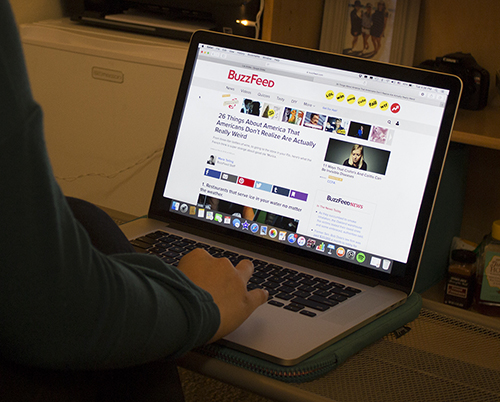Behind each news article lies the facts of the case. A story about murder reads only as well as the validity of the facts. If the facts of a story do not line up with reality in an extreme and purposeful sense, the news is fake. In the case of this election season and the events which followed it, this style of news became popular. In this strange post-election time the world exists in, users on the internet need to fact-check their news for validity.
making matters worse
Fake news always existed as a problem in the past. Fake publications such as the National Enquirer regularly post untrue news about prominent figures in the world in the name of profit. Most people ignore the source because they know the articles published by the publications suggest an ulterior motive.
In this election season, though, something different took place: many people believed the lies of fake media. To make matters worse, fake news sites came in droves during this election cycle to smear both candidates with seemingly outlandish and poorly written articles. Sites like libertywritersnews.com purposely create fake news that supports Trump and bashes the liberal agenda. The site posts clickbait articles with headlines like “BREAKING: Obama Did Something Horrible Before Leaving The Office For Trump!” almost daily. Even worse, the content curators outrighted stated in an LA Times article that they care solely about site traffic and clicks for profit.
After the election, other stories about anti-Trump protesters ran wild. One specific case of a fake tweet going viral regarding Clinton busing protesters through Austin, Texas captures the essence of this movement.
In one sense, this trend looks disappointing because readers actually believe the fake news published. This movement, though, should not come as a surprise because of how users have interacted with the news in recent years. According to a study by Columbia University and the The Center for Direct Scientific Communication reported in The Washington Post, 59 percent of shared links are not actually clicked on. This means that people tend to share stories without even reading them, which can lead to unfortunate outcomes like this recent fake news trend.
its rapid-reaction nature
Users of the internet need to check the validity of news articles now more than ever. Although the problem looks grave, combating the issue takes little to no effort. Simply search the headline of a shady article on Google. If the only link that turns up is the link from the original article, then no other news outlet is reporting on it, meaning it is fake. Another way to fact-check a story is by reading multiple stories on one subject, such as a shooting, to make sure the facts line up across the board. Sites like Snopes dedicate themselves solely to debunking fake news.
In an ever-changing, highly unpredictable world, news spreads like wildfire thanks to the widespread use of the internet and its rapid-reaction nature. Controlling the language of the media can shape outcomes of elections, as shown this year. Users of the internet cannot let people who care solely about money and clicks dictate the language of the media. Rather, people need to fact-check their news by doing their own research on different subjects and cross-examining facts across different articles posted by diferent publication. Student can also come up with other creative ways to combat the spread of fake news such as coding algorithms to block fake news like a group of students did at Princeton University. As much as sites can ban the practice, though, the onus ultimately falls on the people to make sure what they read is true.







